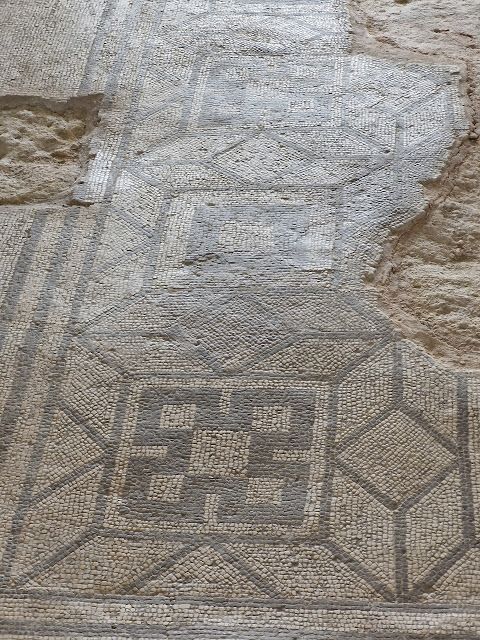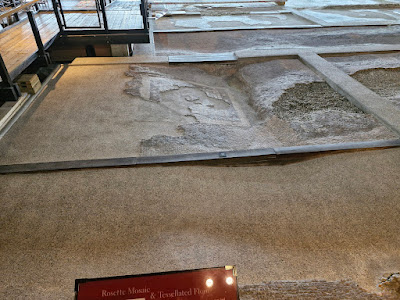On our way home from Chichester, I persuaded SWMO Emma to accompany me to Fishbourne Roman Palace, which was a 15 minute drive south of Chichester, not really on our way home, but hey ho!

Much of the palace has been excavated and is preserved, along with an on-site museum. The rectangular palace surrounded formal gardens, the northern parts of which have been reconstructed.
Extensive alterations were made in the second and third centuries AD, when many of the original black and white mosaics were overlaid with more sophisticated coloured work, including the perfectly preserved Dolphin mosaic in the north wing. More alterations were in progress when the palace burnt down in around 270 AD, after which it was abandoned.
Upon entering the site, you're ushered around to one side of the building to see some artifacts, before you get to the palce.
The site was accidentally discovered in 1805, during the construction of a new home on the grounds of the ancient Roman ruin.Workers discovered 13-foot-wide (4.0 m) pavement as well as fragments of columns. In the following years, additional remains such as pottery fragments and portions of mosaic tiles were unearthed by local inhabitants who lived within close proximity to the site. However, the locals were unable to conceive the fact that the findings were part of a larger unknown structure that remained below the surface. It wasn't until 1960, that Aubrey Barrett, an engineer working for the Portsmouth Water Company, discovered the foundations of a “masonry building” located north of the main road while digging a trench for a water main.
This rediscovery of the ancient structure caught the attention of the Susssex Archeollogical Society and triggered the first series of excavations, directed by the archaeologist Barry Cuncliffe and his team in 1961. Cunliffe's findings from his digs provide the most significant portion of the information associated with the site. In the years following the initial excavations led by Cunliffe, a series of further excavations were conducted, each of which focused on unearthing various other areas of the ancient site.
To the surprise of archeologists and historians alike, each stage of excavations revealed previously unknown details surrounding the site's vast and complex history. For instance, from 1995 to 1999, the archeologists John Manley and David Rudkin conducted digs that focused on southern portions of the site, which exposed significant evidence of human activity prior to the Roman conquest in 43 AD. Over the course of five years, Manley's team of archeologists discovered nearly twelve thousand artifacts, including flint tools that are believed to date back to the Mesolithic period (around 5000–4000 BC) and could indicate the presence of a hunter and gatherer settlement near the present-day location of the Fishbourne palace. However, the most intriguing and significant evidence of pre-Roman human activity at the site comes from a ditch containing nearly seven hundred fragments of pottery and a cup that can be traced back to a period within the Late Iron Age. The findings made by Manley and his team challenge Cunliffe's earlier assumptions by suggesting the likely presence of significant human activity at Fishbourne prior to 43 AD.
The site of the excavated Roman Villa was so large that it became known as Fishbourne Roman Palace. In size, it is approximately equivalent to Nero's Golden home in Rome or to the Villa Romana del Casale near to Piazza Armerina in Sicily, and in plan it closely mirrors the basic organization of the emperor Domitain's palace, the Domus Flavia, completed in 92 AD upon the Palatine Hill in Rome. Fishbourne is by far the largest Roman residence known north of the Alps. At about 500,000 square feet (46,000 m2), it has a larger footprint than Buckingham Palace.
I included my fat sausage fingered had to get a sense of scale.
We'd only been here 10 minutes when SWMBO pipped up, "You ain't gonna read everything , are you?"
"Well, yeh?"
I'm going to sit down then!
I then got the 2 finger salute!
A great looking diorama, that would grace any wargaming table!
Now onto the palace, by this time I'd lost Emma, she'd vanished????
I carried on looking at the "Rocks" as she calls them!
It just amazes me that this still looks what it looked like after approx 1949 years!!
Amazing???
Every mans pain, re-doing the decorating. Laying a new floor over the old one.
Again this just amazes me???
At the site the only floor you see is the north wing, above, just look at what's still under the ground?
Can you see the diagonal trench cutting across the middle?
The indentations you see here are post holes, made before the palace was built.
I highly recommend a visit to Fishbourne Roman Palace, if you get the chance.
Its a place I've always wanted to go to, but just never had the chance before. 10/10











































































Quite a bit here. Will return to digest more. Great visit.
ReplyDeleteIts a long post, I cut loads of pics but couldn't justify cutting anymore.
DeleteThat certainly is a most impressive Roman site ray - amazing that it's so enormous and is so much larger than anything else outside of Italy, by the sound of it! Despite the two fingered salute, I think you did pretty well getting your SWMBO to agree to the visit in the first place!
ReplyDeleteMe too!
DeleteVery impressive. For some of those models there you'd just about want to bring a few figures along and get a game in!
ReplyDeleteYou could!
DeleteWow, talk about ancient history!
ReplyDeleteYep.
DeleteThanks for a great virtual tour. I must get back there one day. So, when are you building it?
ReplyDeleteOh I'd like too, for sure, perhaps in 2mm?
DeleteWow, thanks Ray, I remember going there on a school trip once. A very long time ago. There seems to be loads more than I can remember.
ReplyDeleteIt was a great place to visit!
DeleteThe mosaics really are impressive. Some great exhibits there.
ReplyDeleteIt was brilliant tbh.
DeleteOne of my favourite sites in Britain. Been there several times, as it was an easy train ride from my Dads. Great photos, and the mosaics are stunning.
ReplyDeleteThey are stunning. It's amazing that they've been just laying there all that time?
DeleteSuper tour of a really interesting site, very impressive.
ReplyDeleteCheers Donnie!
DeleteVery interesting site, great photos - I always like these dioramas cause it´s like the history comes alive again.
ReplyDeleteReminds me I have to visit the Römer-Kelten Museum at Manching again :-D
Looks a pretty cool place.
DeleteWhat a truly remarkable place, not sure I had ever heard of it, but have a nagging feeling that I have been as a young boy. May need a trip to the loft to see if I have the guide book, mind you it will nearly as old as the mosaics if I do!
ReplyDeleteLol
DeleteGreat photos Ray, of an amazing looking site!
ReplyDeleteIt certainly is!
DeleteLovely stuff Ray. I will be going there in a couple of weeks having long wanted to do so. It was the home of "The Great King of the Britons". I forget his name but he was an Atrebate. He got his regal title for sticking with the Romans during Boudicca's rebellion.
ReplyDeleteExcellent, you'll enjoy it as much as I did, no doubt!
DeleteGreat stuff. Been here several times and it's always impressive.
ReplyDeleteCertainly is Lee.
DeleteThank for sharing Ray I think I need to have another trip to fish prune as it is many years since I last went 🤔
ReplyDeleteIt was brilliant, so please do!
DeleteGreat; thanks, Ray! Not been for a very long time but all your pictures are an excellent revision aid! One day I'll get there again...
ReplyDeleteI'm sure you will.
DeleteI haven't been to that site, Ray. I've been to Lullingstone and other Roman remains throughout the UK and Italy. Sounds you enjoyed yourself anyway. You owe SWMBO a big favour her being so indulging.!
ReplyDeleteAgreed!
Delete